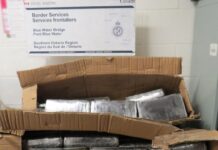
All photos by Jay Sharma of Mahi Photo Studio


 A multi-agency, multi-national investigation into a major heroin trafficking and importation operation has resulted in the arrest of 28 individuals, the RCMP Federal Serious and Organized Crime (FSOC), Vancouver Police Department (VPD) and Canada Border Services Agency (CBSA) announced on Monday.
A multi-agency, multi-national investigation into a major heroin trafficking and importation operation has resulted in the arrest of 28 individuals, the RCMP Federal Serious and Organized Crime (FSOC), Vancouver Police Department (VPD) and Canada Border Services Agency (CBSA) announced on Monday.
The investigation began in June 2013 when RCMP FSOC members identified a group of Vancouver area-based individuals involved in importing kilogram quantities of heroin. Shipments were originating in Afghanistan, and would travel primarily on airlines to Canada via Africa. They would then be distributed in various cities, including Vancouver.
The Canadian investigation determined that the scope of the distribution network was extensive and involved numerous countries around the world. Investigators enlisted the assistance of numerous international agencies including the South African Police Service and the Belgium Federal Police in order to share intelligence, information and resources necessary to identify, target and dismantle the operation.
This joint investigation revealed a complex network of individuals responsible for importing large shipments of heroin from Afghanistan into South Africa destined for Europe and North America.
A total of 28 individuals have been arrested and 37 kg of heroin have been seized from various locations in Canada, including Vancouver, as well as from Belgium and South Africa.
RCMP Inspector Cal Chrustie of FSOC said that these combined efforts had resulted in a major disruption of this transnational heroin importation and trafficking network. He added: “Transnational organized crime, including heroin trafficking, is a global problem in which geographical boundaries do not exist. Partnerships with both our domestic and international law enforcement agencies are critical in supporting our collective regional law enforcement efforts to mitigate threats to Canada.”
“In a multifaceted and ever-changing environment, integrated efforts amongst the Canadian and international law enforcement community are vital to combating and disrupting criminal activity more effectively. The RCMP is committed to fighting organized crime to the full extent of the law,” said Assistant Commissioner James Malizia who is in charge of Federal Policing Criminal Operations in Ottawa.
“With collaboration comes a greater chance of success and there is no better example of that than Project Phototaxis,” said VPD Superintendent Mike Porteous. “Bringing together the resources of various law enforcement agencies with the common goal of stemming the flow of heroin into Canada was clearly effective. It’s not only the quantifiable outcomes that speak to the success of this project. It’s easy to measure the drugs seized and the charges laid. What is often not seen is the impact at street level. The people arrested during Project Phototaxis were individuals who were profiting off the misery of some of the most vulnerable people in our society, men and women that our patrol members interact with often on a daily basis that we are sworn to protect.”
“The CBSA is proud to have worked closely with its partners in Canada and abroad to dismantle this extensive smuggling operation,” said Yvette-Monique Gray, CBSA Director of Enforcement and Intelligence Division, Pacific Region. “Within CBSA we had support from our intelligence and front line operations in Montreal, Edmonton, Calgary and Toronto. These strong internal and external partnerships are crucial in protecting our country and communities, and impede the ability for criminals to profit from these illegal activities.”













